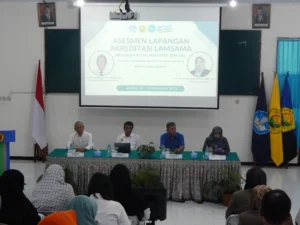 Dean of FMIPA UNEJ, Drs. Achmad Sjaifullah, M.Sc., Ph.D., signed a memorandum of understanding with Ijen Geopark, which was attended by Abdillah Baraas, S.T., as Chair of Ijen Geopark (5/1). “This relationship will expand the scope of cooperation that FMIPA carries out, with Ijen Geopark exchanging information and energy in various matters, especially in the environmental sector,” said the Dean of FMIPA at UNEJ. Also present at the event were two Biology Department lecturers who are also environmental activists, Dra. Hari Sulistiyowati, M.Sc., Ph.D., and Arif Mohammad Siddiq, S.Si., M.Si., who have collaborated several times with Geopark Ijen.
Dean of FMIPA UNEJ, Drs. Achmad Sjaifullah, M.Sc., Ph.D., signed a memorandum of understanding with Ijen Geopark, which was attended by Abdillah Baraas, S.T., as Chair of Ijen Geopark (5/1). “This relationship will expand the scope of cooperation that FMIPA carries out, with Ijen Geopark exchanging information and energy in various matters, especially in the environmental sector,” said the Dean of FMIPA at UNEJ. Also present at the event were two Biology Department lecturers who are also environmental activists, Dra. Hari Sulistiyowati, M.Sc., Ph.D., and Arif Mohammad Siddiq, S.Si., M.Si., who have collaborated several times with Geopark Ijen.
There is a lot of potential in the Ijen Geopark that is very possible to explore, including biosites, geosites, and culture sites. The Dean hopes that with the signed memorandum of understanding, there will be more joint activities such as community service research, especially the student MBKM program. “Students who take MBKM can join Ijen Geopark through internships, and lecturers can collaborate on research to utilize the potential of Ijen Geopark,” he continued. This received the support of Abdillah Baraas, S.T., as chairman of the Ijen Geopark, who hopes for more collaboration with FMIPA UNEJ. Continue reading





